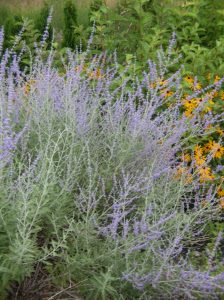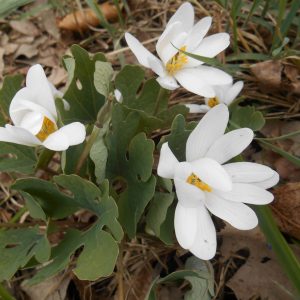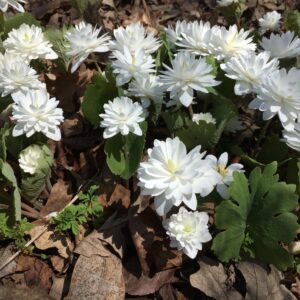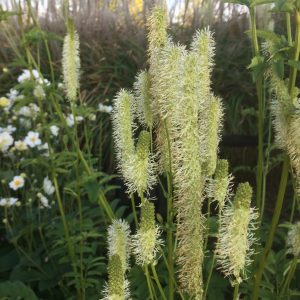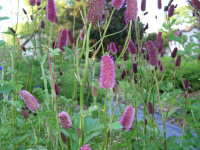Shop
Showing 641–648 of 788 results
-
Salvia yangii syn. Perovskia atriplicifolia Russian sage Z 5-9
Whorls of sky-blue flowers cover innumerable stems and their many branches creating a blue cloud from July through October
Whorls of sky-blue flowers cover innumerable stems and their many branches creating a blue cloud from July through October
Size: 4' x 4'
Care: full sun in moist well-drained to well-drained soil, Heat and drought tolerant. Cut back in spring.
Native: Afghanistan
Wildlife Value: deer & rabbit resistant, Feeds bees and honeybees
Awards: Great Plant Pick Award from Elizabeth Carey Miller Botanical Garden and Perennial Plant Association 1995 Perennial Plant of the Year.Perovskia was named for V.A. Perovski, governor of a Russian province in central Asia around 1890. Introduced to American gardens in 1904. Recommended by English garden maven Gertrude Jekyll in 1908.
-
Sambucus canadensis syn. Sambucus nigra var. canadensis. Elderberry, American elderberry Z 3-9
In late spring to mid-summer lavish, fragrant flat-to dome-shaped clusters of flowers bloom above this arching, multi-stemmed shrub. Late summer into fall the multitude of flowers turn into purple-black, edible fruits, up to 2000 per cluster!
In late spring to mid-summer lavish, fragrant flat-to dome-shaped clusters of flowers bloom above this arching, multi-stemmed shrub. Late summer into fall the multitude of flowers turn into purple-black, edible fruits, up to 2000 per cluster!
Size: 5-12’ x spreading quickly by suckers. Best to grow as hedge, along a roadside, fence-line or forest edge.
Care: sun to part shade in moist to well-drained soil
Native: Americas east of Rocky Mountains south to Bolivia. Wisconsin native
Wildlife Value: branches and leaves make nesting sites and give cover for birds.. Many birds (including, Pheasant, Bluebird, Cedar waxwing, Cardinal, Mockingbird and others) as well as some mammals eat the sweet, but slightly bitter, fruit. It is a source of pollen for numerous bees and other insects.Collected before 1735. Native Americans made extensive use of this, Cherokee used it topically for boils, burns and infections and internally for rheumatism, fevers, dropsy, as a diuretic, and of course ate the berries. Costanoan made its hollow twigs into pipes, flutes and shafts for arrows. Several Natives infused the flowers and foliage with hot water to make steam baths. And many natives ate it, boiled it, jammed it, and added the fruit to cakes. Today people eat them in jellies, jams, pancakes, pies and wine and make homeopathic medicine from it. Reportedly ripe berries are high in vitamin C and fiber. It’s also an antioxidant.
**LISTED AS OUT OF STOCK BECAUSE WE DO NOT SHIP THIS ITEM. IT IS AVAILABLE FOR PURCHASE AT OUR RETAIL LOCATION.
-
Sanguinaria canadensis Bloodroot, Indian paint, Red Puccoon Z 3-9
Elegant, swan-white anemone-like blooms showcase bright yellow stamens in spring emerging from the center of glaucus,lobed, puckered, rolled leaves. Both the leaves and root contain a red sap. (Bloodroot). Ephemeral, dies back in summer.
Available for purchase in Spring only
Elegant, swan-white anemone-like blooms showcase bright yellow stamens in spring emerging from the center of glaucus,lobed, puckered, rolled leaves. Both the leaves and root contain a red sap. (Bloodroot). Ephemeral, dies back in summer.
Size: 6” x 12”
Care: part shade to shade in moist well-drained soil
Native: Nova Scotia to Manitoba, south to Florida and Arkansas, Wisconsin native
Wildlife Value: deer resistant. Pollen, but no nectar, makes this attractive to many different bees. Ants distribute the seeds.Sanguinaria is Latin meaning “blood,” so named for the red color of the sap. Natives used sap to make dye for skin, clothing, weapons, and baskets. Used to induce abortions, as well as an aphrodisiac and to cure sexually transmitted disease. The root rubbed on the palm of the hand was a love charm for Ponca men. Iroquois prescribed it for diarrhea and constipation, to draw out slivers, hiccups, and generally as a panacea. It was administered to those who saw a corpse. Sioux used a weak solution to cure fever, rheumatism, congestion, and skin cancer Ojibwa made dried roots into a necklace to prevent bleeding. Collected by Rev. John Banister in colonial Virginia c. 1678. According to Pennsylvania nurseryman John Bartram(1699-1776) this was “…(C)alled by the Country People, Red Root, or Tumerick The Root dried and powdered is recommenced by Dr. Colden, as a Cure for jaundice, the Powder has been given to the Weight of a Drachm in Small Beer; and by others, for the Bite of a Rattle Snake.” Grown at Shadwell, Jefferson’s birthplace and home until it burned in 1770. Grown at America’s 1st botanic garden, Elgin Botanic Garden 1811, located where Rockefeller Center now stands. Pressed specimen in Emily Dickinson’s herbarium.
-
Sanguinaria canadensis f. multiplex Double-flowered bloodroot Z 4-8
Snowballs of pure white buds open to dozens of petals atop unfolding, glaucous, mitten-shaped foliage in early spring. By late spring it recedes into the earth and goes dormant. Inside its roots are same red sap as in the single form. It is sterile and can only be propagated by division. Easy to divide – dig after blooming and cut or pull apart two stems making sure both halves have roots. Then replant right away.
Ephemeral- Available for purchase in spring only
Snowballs of pure white buds open to dozens of petals atop unfolding, glaucous, mitten-shaped foliage in early spring. By late spring it recedes into the earth and goes dormant. Inside its roots are same red sap as in the single form. It is sterile and can only be propagated by division. Easy to divide – dig after blooming and cut or pull apart two stems making sure both halves have roots. Then replant right away.
LIMITED QUANTITIES AVAILABLE, LIMIT OF 1 PER CUSTOMER PLEASE.
Size: 6” x 12”
Care: part-shade to shade in moist well drained soil. Mark its location so you don’t forget in September and dig into it.
Native: mutation of native American single-form
Wildlife Value: deer resistant
Awards: Royal Horticultural Society named this one of the top plants of the last 200 years Award of Garden Merit; Great Plant Pick 2004Discovered by Guido von Webern growing in a clump of single Bloodroots in the 7 acre plot he recently purchased at the corner of North Main St and Turner Rd in Dayton OH in 1917.
-
Sanguisorba canadensis Canada burnet, Caribon feed, Indian tobacco, Marsh lily, Greater burnet Z 3-8
White spikes August – October when little else blooms in shady places
OUT OF STOCK
White spikes August – October when little else blooms in shady places
Size: 3-5’ x 3’
Care: part shade to sun in moist well drained soil
Native: Newfoundland, Labrador to Georgia W to Alaska, Wisconsin native.Sanguisorba is Latin meaning to soak up blood, for the plant’s reputed ability to clot blood. Collected in Canada in 1633. Collected in the U.S. by French plant hunter André Michaux.(1746-1802) Grown at America’s 1st botanic garden, Elgin Botanic Garden 1811.
-
Sanguisorba hakusanensis Korean burnet, Lilac squirrel Z 4 – 9
In mid to late summer bushy purplish-pink tails (like a Barbie doll squirrel tail) nod gracefully downward atop erect stems emerged from a clumping base that sprouts sage-colored, scalloped leaves.
OUT OF STOCK
In mid to late summer bushy purplish-pink tails (like a Barbie doll squirrel tail) nod gracefully downward atop erect stems emerged from a clumping base that sprouts sage-colored, scalloped leaves.
Size: 12-18”x12”
Care: sun to part shade in moist to moist well-drained soil
Native: Korea and JapanSanguisorba is Latin meaning to soak up blood, for the plant’s reputed ability to clot blood. Hakusanensis means coming from Haku, a mountain in Japan where this grows. Described in Botanical Magazine (Tokyo) in 1907.
-
Sanguisorba menziesii Menzies’ burnet Z 4-8
Claret wands of bottle-brush-shaped blooms atop nearly leafless 4’ tall stems in summer
Claret wands of bottle-brush-shaped blooms atop nearly leafless 4’ tall stems in summer
Size: 4' x 2'
Care: full sun to part shade in moist well-drained soil
Native: Alaska, Canada, Pacific NW
Awards: Royal Horticultural Society Award of Garden MeritSanguisorba is Latin meaning to soak up blood, for the plant’s reputed ability to clot blood. This species named for its collector Archibald Menzies (1754-1842), English physician and botanist. He found this in the Pacific NW while on Vancouver’s voyage in 1792 sailing to the Pacific Northwest, California, Alaska & Hawaii.
-
Sanguisorba obtusa Japanese burnet Z 4-9
A confection - neon Barbie-doll pink dangling bottle-brush spikes- in July - August
OUT OF STOCK
A confection – neon Barbie-doll pink dangling bottle-brush spikes- in July – August
Size: 2-3’ x 2’
Care: moist to moist well-drained soil in sun
Native: Honschu Japan
Wildlife Value: attracts bees and butterflies, Deer resistantSanguisorba is Latin meaning “to soak up blood”, for the plant’s reputed ability to clot blood. This species collected before 1873.

